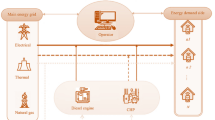
Overview
- Describes a modeling framework (Oemof) that can be used to optimize a given country’s energy supply
- Considers cogeneration, wind and photovoltaic power generation
- Supplies Python code to facilitate implementation of the Oemof model
Part of the book series: Lecture Notes in Energy (LNEN, volume 69)
Access this book
Tax calculation will be finalised at checkout
Other ways to access
About this book
This book describes how a model for optimizing the energy supply system in Germany can be implemented. It focuses on the open energy modeling framework (Oemof) program for modeling energy supply systems. The individual elements of Oemof are described, as well as the model’s structure. The technical components of Oemof are subsequently demonstrated in mathematical calculations, along with sufficient Python code to begin basic modeling.
The book will appeal to anyone with an interest in optimization models for energy supply systems, or in the mathematical description of the technical components of such systems in practical implementation, using a real example, Oemof. Thermodynamic descriptions of combustion are provided, so that readers can focus on modeling aspects. Researchers and practitioners will also find the book useful, as it expands on their knowledge of the technical components of energy supply systems, supported with detailed mathematical calculations.Similar content being viewed by others
Keywords
Table of contents (6 chapters)
Authors and Affiliations
About the author
Bibliographic Information
Book Title: Optimization of Energy Supply Systems
Book Subtitle: Modelling, Programming and Analysis
Authors: Janet Nagel
Series Title: Lecture Notes in Energy
DOI: https://doi.org/10.1007/978-3-319-96355-6
Publisher: Springer Cham
eBook Packages: Energy, Energy (R0)
Copyright Information: Springer Nature Switzerland AG 2019
Hardcover ISBN: 978-3-319-96354-9Published: 29 September 2018
Softcover ISBN: 978-3-030-07180-6Published: 12 January 2019
eBook ISBN: 978-3-319-96355-6Published: 28 September 2018
Series ISSN: 2195-1284
Series E-ISSN: 2195-1292
Edition Number: 1
Number of Pages: XI, 294
Number of Illustrations: 72 illustrations in colour
Topics: Energy Systems, Energy Policy, Economics and Management, Renewable and Green Energy, Operations Research, Management Science, Operations Management



